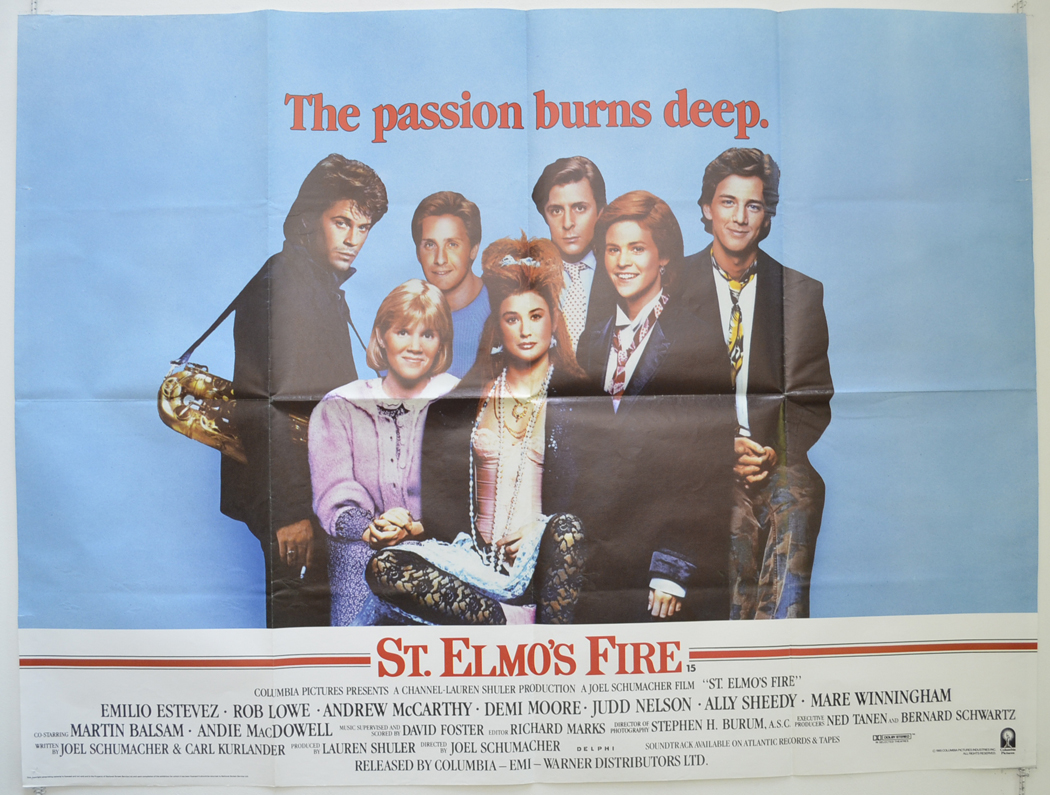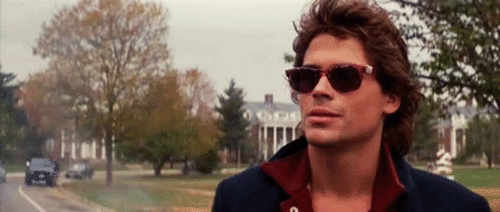by Eric Blume

Director Joel Schumacher’s St. Elmo’s Fire captures 1985 perfectly: the word “yuppie” had just come into vogue, and this film follows seven Georgetown students finding themselves lost after graduation. They’re all white, attractive, fairly affluent, and awfully boring, and nothing much happens in the movie. So why is it so damn watchable?
St. Elmo’s Fire is a curio from this era, because while it wasn’t a huge box office success, it’s an instantly-recognizable title after 22 years. This of course is due to the film’s actors: Rob Lowe, Demi Moore, Emilio Estevez, Mare Winningham, Judd Nelson, and Andrew McCarthy. Schumacher did manage lightning-in-a-bottle with that casting, and while very little about the film is objectively good, watching these actors near the start of their careers provides a kicky joy...
The plots (as they are) involve each character searching for their path after graduation. The movie is dated (and sexist) enough that the men seem to have the real careers and dilemmas, while the women mostly operate in relation to the men. But in the script, the male characters are hollow, vain, selfish, and clueless…so they’re not great roles either. The guys in this movie are often truly despicable people whose “charm” seems to get them by. If the film had actually addressed this situation (a very common real-life phenomenon), or even if the guys were strangely bonded through that in a self-aware way, at least something would be happening in the movie. But the tiny arc of each character is basically the same, and nothing much happens from either a narrative or character standpoint.
But, again, the real juice in St. Elmo’s Fire is the cast, all of whom are still working today to one degree or another, so let’s take them briefly one by one on how they score.

Rob Lowe had certainly not figured out how to act yet at this point. He was obviously granted a career for his preternatural beauty, and while he’s dutifully learned from years of acting with some of the best, and has done some truly fine work by now, his performance here is painfully pedestrian. His proclamation to his wife (“Don’t you give up on me!”) is straight of a high-school scene study class, and he’s always “playing at” wild. However, probably the most honest relationship in the picture is the one he shares with Mare Winningham. He knows her character is hung up on him, and their rapport, with him selfishly pushing the boundaries of her affection and her taking it, feels simple and true. Let’s give Rob a C.
This film came right before Demi Moore’s superstardom, and it’s a reminder of her basic magnetism. Her smoky voice has rarely been put to better use, and she’s the only actor who perceives her role comically. She captures an interesting element where she’s purposefully avoiding the friends, and intent on creating a mystery about herself. Moore brings a smart self-awareness to the character…she’s consciously playing a part, and you can imagine a life for the character when she’s offscreen, because Moore fills in some blanks for you. Plus, she brings some sass, pizzazz, and glamour to the proceedings. Watching the movie again made me miss Demi Moore. She’s so self-conscious now onscreen, but isn’t there a way for some smart director to corral that natural screen magic she has for a comeback? Moore gets a B+.
As for Andrew McCarthy, he’s saddled with a brutally dated and uncomfortable situation out of the gate, where he is presumed gay because he’s “weird”. Everything involving McCarthy, including his actually weird heterosexual obsession with Ally Sheedy’s character, plays out very creepily. He’s not a natural bohemian, and when he finally “comes out” to Sheedy, it’s so desperate and bizarre that you actually worry for her. Let’s give him a C- too.
But McCarthy still fares better than Emilio Estevez and Judd Nelson. They’re at a disadvantage that their characters are insufferable jerks, but instead of toning that down, they play it full-tilt. They’re both so oddly convinced of their right to own the women they’re pursuing, and they’re humorless in their portrayal of it, you basically pray for their scenes to be over. They both get a D.
Ally Sheedy has a nothing role, and her big moment has her positioned to choose between an obnoxious womanizer and a manipulative stalker. Schumacher misses moments to feature Sheedy’s enormous charm, and while she really doesn’t do any acting at all in this movie, she doesn’t do anything wrong either, so maybe a C+?

Then there’s Mare Winningham, who without question is the most talented overall actor of this septet. She’s playing a fairly impossible part, the privileged good girl with no dimensions of her own. But Winningham takes that liability and does something with it: she admits she doesn’t have dimensions of her own, and that she needs to leave behind this cypher she’d been. Her mini-monologue about her peanut butter and jelly sandwich in her own apartment feels appropriately small but also very sweet, earning her a B.
Writing about St. Elmo’s Fire is incredibly difficult, because even after exposing its myriad flaws here, I still have great affection for it. I was in high school when the film came out, and it tapped into the feelings of having to leave a group of friends, and of the roles you play in that group, and how you love those roles and hate those roles. And it had that 80s movie glamour: who wouldn’t want to have a group of friends that pretty at that age? Yes, the film might be terrible, but I still love watching these actors interweaving, and I’ll always have a soft spot in my heart for it.
Are there any objectively terrible movies for which you feel the same?

More 1985
Disney's The Black Cauldron
1985 overview
Brazil's amazing production design
Madonna mania
The Breakfast Club's iconic soundtrack
Movies now streaming from 1985
1985 smackdown -how to vote